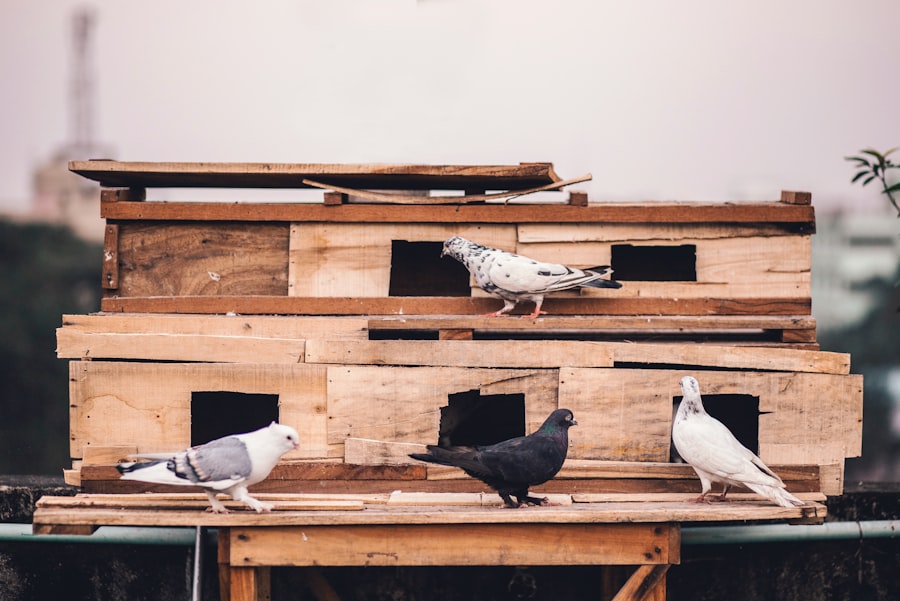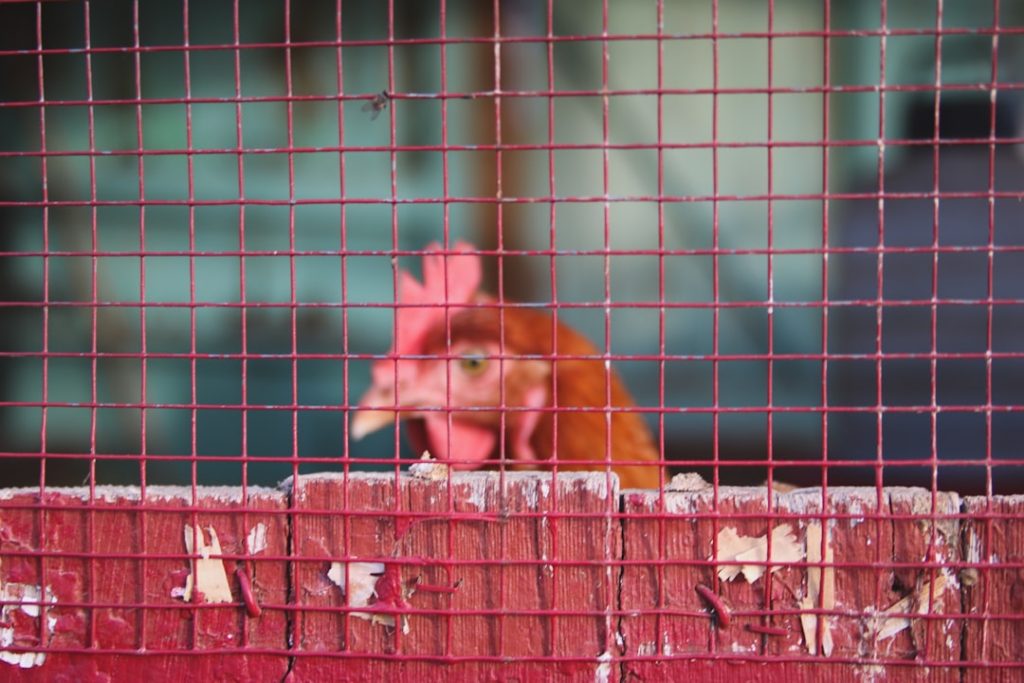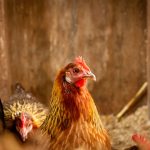Keeping chickens cool is essential for their health and productivity, particularly during hot weather. Chickens are vulnerable to heat stress, which can cause various health problems and potentially be fatal if not addressed. When exposed to high temperatures, chickens may exhibit symptoms such as panting, reduced activity, decreased egg production, and heat stroke.
Chicken owners should be aware of these signs and take preventive measures to maintain their flock’s comfort and well-being. By prioritizing temperature management, owners can help ensure their chickens remain healthy and productive even in extreme heat. Unlike humans, chickens cannot sweat to regulate their body temperature.
Instead, they rely on panting and seeking shade to cool down. However, these natural cooling mechanisms may be insufficient during periods of intense heat. As responsible caretakers, chicken owners must provide their birds with adequate resources to maintain a comfortable body temperature.
Understanding the importance of keeping chickens cool enables owners to implement appropriate measures and create a safe environment for their flock, ultimately promoting their overall health and productivity.
Table of Contents
Key Takeaways
- Keeping chickens cool is crucial for their health and well-being, especially during hot weather
- Creating a shaded area in the chicken coop or run helps chickens escape the direct sun and heat
- Providing plenty of fresh, cool water is essential to keep chickens hydrated and cool
- Utilizing natural ventilation in the chicken coop, such as windows and vents, helps maintain a comfortable temperature
- Using fans or misters can further cool the chicken coop and provide relief for the chickens
- Implementing cooling treats, such as frozen fruits and vegetables, can help lower the chickens’ body temperature
- Monitoring chickens for signs of heat stress, such as panting, lethargy, and reduced egg production, is important for their overall well-being
Creating a shaded area for chickens
Benefits of Shade for Chickens
There are several ways to create a shaded area for chickens, such as using natural shade from trees or constructing man-made structures like awnings or tarps. It’s important to ensure that the shaded area is large enough to accommodate the entire flock and that it is strategically positioned to provide relief from the sun throughout the day.
Natural Shade from Trees
Natural shade from trees is an excellent option for providing chickens with a cool retreat from the sun. Trees not only offer shade but also provide a natural and calming environment for chickens to relax and forage.
Man-Made Structures for Shade
If natural shade is limited, chicken owners can create man-made structures using materials like tarps or awnings to cover areas of the chicken coop or run. These structures should be securely anchored to withstand wind and other elements while providing adequate shade for the chickens. By creating a shaded area for chickens, owners can help their flock stay cool and comfortable, reducing the risk of heat-related health issues.
Providing plenty of fresh, cool water

Providing plenty of fresh, cool water is essential for keeping chickens hydrated and cool during hot weather. Water is crucial for regulating a chicken’s body temperature and preventing dehydration, especially when temperatures soar. It’s important to regularly check and refill water containers to ensure that chickens have access to an ample supply of clean, cool water throughout the day.
Additionally, placing water containers in shaded areas can help keep the water cooler for longer periods, providing chickens with a refreshing source of hydration. During hot weather, chickens may consume more water than usual as they work to stay cool and maintain their body temperature. Therefore, it’s important for chicken owners to monitor water consumption and refill water containers as needed to prevent dehydration.
Placing water containers in shaded areas can help keep the water cooler for longer periods, providing chickens with a refreshing source of hydration. In addition to regular water containers, some chicken owners opt to provide their flock with shallow pans or tubs filled with cool water for wading and splashing. This not only helps keep chickens cool but also provides them with a fun and stimulating activity during hot weather.
Utilizing natural ventilation in the chicken coop
Utilizing natural ventilation in the chicken coop is an effective way to keep the air circulating and prevent heat buildup during hot weather. Proper ventilation helps remove stale air, moisture, and heat from the coop while allowing fresh air to flow through, creating a more comfortable environment for the chickens. Natural ventilation can be achieved by installing windows, vents, or openings in the coop that allow for cross-ventilation and airflow.
It’s important to strategically position ventilation openings to maximize airflow while minimizing drafts that could cause discomfort to the chickens. Windows are an excellent way to introduce natural ventilation into the chicken coop, allowing fresh air to enter while stale air exits. By opening windows on opposite sides of the coop, chicken owners can create cross-ventilation that helps keep the air circulating and prevents heat buildup.
Additionally, vents or openings near the roofline can help release hot air that rises to the top of the coop, further aiding in cooling the interior space. It’s important to regularly clean and maintain ventilation openings to ensure they remain unobstructed and effective in promoting airflow throughout the coop.
Using fans or misters to cool the chicken coop
Using fans or misters to cool the chicken coop can provide additional relief for chickens during hot weather by circulating air and lowering the ambient temperature inside the coop. Fans can be strategically placed to create airflow throughout the coop, while misters can be used to spray a fine mist of water into the air, creating a cooling effect as it evaporates. These methods can help reduce heat stress and keep chickens comfortable during sweltering temperatures.
Fans are an effective way to circulate air and lower the temperature inside the chicken coop. By strategically placing fans in key locations, such as near windows or vents, chicken owners can create airflow that helps keep the air moving and prevents heat buildup. Additionally, misters can be used to spray a fine mist of water into the air, creating a cooling effect as it evaporates.
This can help lower the ambient temperature inside the coop and provide relief for chickens during hot weather. It’s important to monitor fans and misters regularly to ensure they are functioning properly and are not causing any discomfort or stress to the chickens.
Implementing cooling treats for chickens

Frozen Fruits and Vegetables: A Refreshing Snack
Frozen fruits and vegetables are excellent options for cooling treats as they provide hydration and essential nutrients while helping chickens stay cool. Watermelon, cucumbers, and berries are popular choices that chickens enjoy and can be frozen before being offered as a refreshing snack.
Ice Cubes: A Fun and Stimulating Activity
Additionally, ice cubes can be placed in shallow pans or tubs for chickens to peck at and enjoy as they melt, providing them with a fun and stimulating activity during hot weather.
Benefits of Cooling Treats for Chickens
By implementing cooling treats for chickens, owners can help their flock stay cool and entertained while ensuring they remain healthy and hydrated.
Monitoring chickens for signs of heat stress
Monitoring chickens for signs of heat stress is crucial for identifying any potential issues early on and taking proactive measures to keep them cool and comfortable. Signs of heat stress in chickens may include panting, lethargy, decreased egg production, pale combs and wattles, or even collapse. It’s important for chicken owners to regularly observe their flock for any signs of distress or discomfort during hot weather and take immediate action to address any issues that arise.
Regularly observing chickens for signs of heat stress allows owners to intervene quickly and provide their flock with the necessary resources to stay cool and comfortable. This may include providing additional shade, ensuring access to fresh water, or implementing cooling treats to help lower their body temperature. By monitoring chickens closely during hot weather, owners can ensure that their flock remains healthy and productive while minimizing the risk of heat-related health issues.
Additionally, being proactive in addressing signs of heat stress demonstrates a commitment to the well-being of the flock and fosters a strong bond between chicken owners and their feathered friends. In conclusion, keeping chickens cool is essential for their health and well-being, especially during hot weather. By creating a shaded area, providing plenty of fresh water, utilizing natural ventilation, using fans or misters, implementing cooling treats, and monitoring for signs of heat stress, chicken owners can ensure that their flock remains healthy and comfortable even in sweltering temperatures.
Prioritizing the cooling of chickens not only promotes their well-being but also contributes to their productivity and overall happiness. By understanding the importance of keeping chickens cool and taking proactive measures to address heat stress, chicken owners can create a safe and comfortable environment for their feathered friends while fostering a strong bond based on care and compassion.
If you’re looking for more tips on keeping your chickens comfortable in the heat, check out this article on creating a Hannah Montana chicken coop. It offers creative ideas for providing shade and ventilation to keep your chickens cool during the hot summer months.
FAQs
What are some ways to keep chickens cool in hot weather?
Some ways to keep chickens cool in hot weather include providing shade, ensuring access to fresh water at all times, using fans or misters, and providing frozen treats such as ice blocks or frozen fruits and vegetables.
What are the signs of heat stress in chickens?
Signs of heat stress in chickens include panting, lethargy, reduced egg production, decreased appetite, and holding their wings away from their body. It’s important to address heat stress promptly to prevent serious health issues.
How can I provide shade for my chickens?
You can provide shade for your chickens by using natural shade from trees or shrubs, setting up tarps or umbrellas in their outdoor area, or creating a shaded area within their coop or run using materials like plywood or shade cloth.
How often should I change the water for my chickens in hot weather?
In hot weather, it’s important to change the water for your chickens at least once or twice a day to ensure it stays cool and clean. Chickens drink more water in hot weather to stay hydrated, so it’s important to keep their water source fresh.
Can I give my chickens frozen treats to help them stay cool?
Yes, you can give your chickens frozen treats such as ice blocks, frozen fruits, or frozen vegetables to help them stay cool in hot weather. These treats can provide both hydration and entertainment for your chickens.
Meet Walter, the feathered-friend fanatic of Florida! Nestled in the sunshine state, Walter struts through life with his feathered companions, clucking his way to happiness. With a coop that’s fancier than a five-star hotel, he’s the Don Juan of the chicken world. When he’s not teaching his hens to do the cha-cha, you’ll find him in a heated debate with his prized rooster, Sir Clucks-a-Lot. Walter’s poultry passion is no yolk; he’s the sunny-side-up guy you never knew you needed in your flock of friends!







